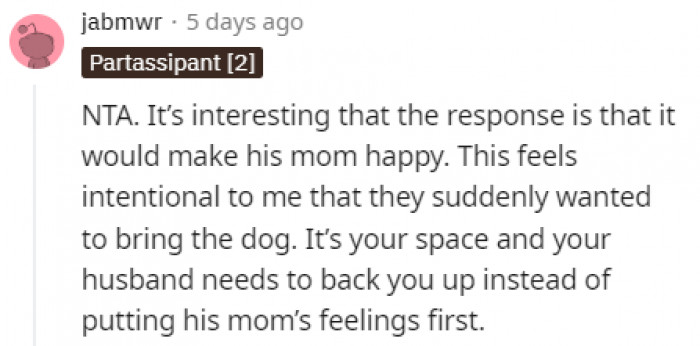Woman Feels Judged After Refusing To Let Her Future In-Laws Bring Their Dog To Her Home
Having a fear of dogs can be hard to live with sometimes, especially since dogs are more popular than ever and it seems like every home has one of these furry friends. There are plenty of reasons why people are afraid of dogs, and it's usually due to past bad experiences, such as being attacked or bitten by one.
It's important to be understanding of people with phobias like this and to do whatever you can to make your home comfortable for them when you visit. Therefore, the same consideration should be given when you're visiting a person who has a phobia.
This story, posted to Reddit by user u/AITA62, revolves around a woman who asks Reddit if she did anything wrong by refusing to allow dogs in her home. The no-dogs rule had been in place for years in her home, which she shared with her fiancé, due to her fear of dogs stemming from a traumatic experience.
After years of living under this rule, her fiancé suddenly wanted to let his parents bring their dog when visiting, which she opposed. Her fiancé tried to make her feel like the bad guy for not allowing the dog in their house, which made her angry.
She felt that making her unhappy just to please his mother wasn't fair and that there was no reason to blame her for a phobia she couldn't control. Scroll down to read the entire story that was posted to Reddit so you can get all the details and see whether or not you agree with what the other users on Reddit had to say.
The no dogs/pets rule has been in effect for years after OP was attacked by her friend's dog.

She has no issues with dogs when she's visiting a friend in their home, but when it's her home in question, she feels like she gets to decide if dogs are allowed or not.

This wasn't the first time that her future in-laws were supposed to visit, and they would always respect their rule and find someone to take care of the dog while they were away.

Navigating Differences in Values
Differences in values and priorities can create tension in relationships, particularly when they involve family dynamics. Research in relational psychology emphasizes that couples often face challenges when their values do not align. In this case, the woman's reluctance to allow her future in-laws to bring their dog into her home reflects a different set of values regarding home environment and comfort. Understanding these differences can help couples navigate conflicts more effectively and foster mutual respect.
Understanding Boundaries in Relationships
Setting boundaries is a crucial aspect of healthy relationships, allowing individuals to express their needs and preferences. Research indicates that clear boundaries contribute to emotional well-being and reduce feelings of resentment. In the case of the woman refusing to let her future in-laws bring their dog, establishing personal boundaries is essential for maintaining harmony and respect within the relationship.
Understanding the importance of boundaries can empower individuals to communicate their needs effectively.
Most people love dogs, but not everyone wants them in their home.

This is a good rule to follow in general.

It's hard to recover from a traumatic experience, and just one dog attack can change your mind about them forever.

Moreover, the concept of 'family loyalty' can complicate these situations. Individuals often feel a strong sense of obligation to their families, which can create internal conflict when their partner's values differ. A study published in the Journal of Social and Personal Relationships indicates that individuals may experience guilt or anxiety when navigating these conflicting loyalties. Encouraging open dialogue about values and priorities can help individuals articulate their feelings and find common ground in their relationships.
Moreover, the concept of autonomy plays a significant role in boundary-setting. Studies show that individuals who feel their autonomy is respected are more likely to experience satisfaction in their relationships. Encouraging open discussions about personal preferences can enhance understanding and reduce conflicts related to boundaries.
Another wise message that applies to everything.

It's hard for the fiancé to pick a side, apparently.

People on Reddit were clearly on OP's side in this argument.

The Role of Compromise in Relationships
Compromise is a fundamental aspect of healthy relationships, particularly when navigating differences in values. Research indicates that successful couples often engage in collaborative problem-solving, seeking solutions that honor both partners' perspectives. In this case, discussing potential compromises, such as setting boundaries for the dog in the home, can help both partners feel heard and respected. Encouraging collaborative discussions can foster a sense of teamwork and strengthen the relationship.
The Emotional Impact of Compromise
Compromising on personal boundaries can lead to feelings of resentment and frustration. Research indicates that when individuals feel pressured to compromise their values, it can negatively impact their emotional health. In this situation, finding a balance between accommodating others and preserving personal boundaries is vital for maintaining healthy relationships.
Encouraging individuals to express their feelings about compromise can foster healthier dialogues and mutual respect.
If you're visiting someone, you have to respect their home.

Having respect for other people is something we should all practice, especially in situations when you're visiting someone's home. It seems like this is what the in-laws need.
It's clear that people on Reddit sided with OP, but do you agree with them?
Additionally, the role of empathy in navigating boundary discussions cannot be overlooked. Studies suggest that understanding another person's perspective can enhance communication and facilitate more productive conversations. Encouraging family members to empathize with each other's feelings can lead to a more supportive environment.
Navigating Family Dynamics
Family dynamics often complicate boundary-setting, as individuals may feel a sense of obligation to accommodate others. Research in family systems theory indicates that patterns of behavior within families can create challenges in establishing boundaries. Understanding these dynamics can empower individuals to assert their needs while navigating familial pressures.
Encouraging open discussions about family expectations can help clarify boundaries and improve relationships.
It's also important to recognize that emotional regulation plays a key role in boundary-setting. Research shows that individuals who practice emotional regulation are better equipped to communicate their needs effectively. Encouraging individuals to develop emotional awareness can enhance their ability to express boundaries respectfully.
The Importance of Clear Communication
Clear communication is essential for establishing and maintaining boundaries in relationships. Studies indicate that effective communication can prevent misunderstandings and foster mutual respect. Encouraging individuals to articulate their feelings and needs can create a more harmonious environment and reduce the likelihood of conflicts.
Promoting a culture of open dialogue can significantly enhance relationship satisfaction.
Lastly, recognizing the role of personal values in boundary-setting is essential. Research suggests that individuals who align their boundaries with their personal values experience greater emotional well-being. Encouraging individuals to reflect on their values can guide them in establishing boundaries that resonate with their true selves.
Psychological Analysis
This situation underscores the importance of setting personal boundaries in maintaining healthy relationships. By fostering empathy and open communication, individuals can navigate family dynamics more effectively and create a supportive environment.
Analysis generated by AI
Analysis & Alternative Approaches
In conclusion, boundary-setting is a vital component of healthy relationships that fosters mutual respect and understanding. By promoting clear communication, empathy, and emotional awareness, individuals can navigate familial expectations and assert their needs effectively.
Encouraging discussions around personal values can further enhance relationship satisfaction and emotional well-being.
Additionally, the emotional responses to family dynamics can be profound. Individuals may feel pressured to conform to their family's expectations, leading to feelings of resentment or frustration. Studies show that these emotions can create distance in relationships and hinder effective communication. Understanding the psychological impact of these dynamics can help individuals develop coping strategies and foster healthier interactions.
The Importance of Clear Communication
Clear communication is crucial in addressing differences in values and expectations. Research in communication studies emphasizes the significance of expressing one's feelings and needs openly. For instance, using 'I' statements can help individuals articulate their perspectives without placing blame, fostering constructive dialogue. Encouraging couples to practice these communication techniques can enhance emotional intimacy and reduce misunderstandings.
Moreover, involving family members in discussions can help create a more inclusive environment. Research suggests that family meetings can provide a platform for addressing conflicting values and expectations. By encouraging family members to express their thoughts and feelings, individuals can foster a sense of belonging and support within the family unit. This approach can enhance understanding and reduce tensions between partners and their families.
Developing Resilience in Relationships
Building resilience is essential for navigating differences in values and expectations. Research indicates that couples who develop resilience skills are better equipped to handle conflicts and challenges. For instance, practicing mindfulness techniques can help individuals manage their emotional responses and foster a sense of calm during stressful discussions. Encouraging couples to engage in resilience-building activities can promote emotional well-being and strengthen their bond.
Additionally, fostering empathy can enhance understanding and acceptance of differing values. Studies show that empathetic individuals are more likely to navigate conflicts successfully and promote cooperation. Encouraging partners to practice empathy can create a more supportive environment where both individuals feel valued and respected, regardless of their differences.
Creating a Supportive Environment
Ultimately, creating a supportive environment that values open communication and compromise can help couples navigate differences in values effectively. Research indicates that couples who prioritize these principles are more likely to experience relationship satisfaction. Implementing family traditions that celebrate each member's contributions can foster a sense of belonging and reduce tensions. By promoting a culture of understanding and respect, couples can create healthier dynamics in their relationships.
Analysis & Alternative Approaches
In conclusion, navigating differences in values and expectations can be challenging in relationships, particularly when family dynamics are involved. Research supports the idea that clear communication, compromise, and empathy are vital for fostering understanding and respect. By creating a supportive environment, couples can navigate conflicts effectively and strengthen their relationships.



